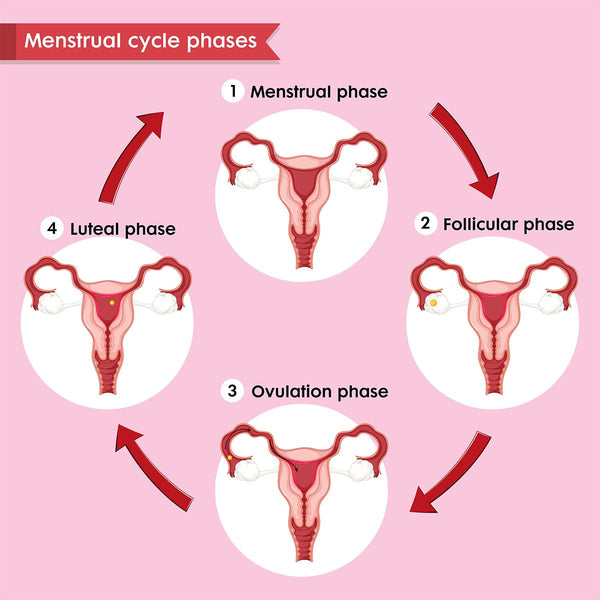

Menstrual health is a critical aspect of overall well-being, yet it has been enveloped in stigma, often regarded as taboo in conversations. Understanding menstrual health is not only about managing monthly periods but also about recognizing its impact on women's physical, mental, and emotional health.
This guide aims to provide comprehensive information on menstruation, common issues, hygiene management, and lifestyle tips to promote a healthy menstrual cycle. By demystifying menstruation, we hope to empower individuals to make informed decisions about their bodies and health.
Understanding Menstruation
Menstruation is a natural biological process and a key indicator of reproductive health, involving the shedding of the uterine lining when pregnancy does not occur. The menstrual cycle, averaging 28 days but varying from person to person, consists of four phases: menstrual, follicular, ovulation, and luteal. Understanding these phases helps in recognizing what's normal and when there might be cause for concern.

Common Menstrual Issues
Premenstrual Syndrome (PMS)
PMS encompasses a variety of symptoms that occur in the week or two before menstruation. Symptoms can include mood swings, tender breasts, food cravings, fatigue, irritability, and depression. Managing PMS often involves lifestyle changes, such as regular exercise, a healthy diet, and stress management techniques.
Dysmenorrhea (Painful Periods)
Many experience cramps or throbbing pains in the lower abdomen during menstruation, known as dysmenorrhea. It can be managed with over-the-counter pain relievers, heat therapy, and certain exercises. Severe pain may require medical attention as it can indicate conditions like endometriosis.
Menorrhagia (Heavy Menstrual Bleeding)
Experiencing excessively heavy or prolonged menstrual bleeding can indicate menorrhagia. It's important to consult a healthcare provider if bleeding significantly impacts daily activities, as it can be a sign of underlying health issues.
Amenorrhea (Absent Periods)
The absence of menstruation, known as amenorrhea, can be primary (if periods never start by age 15) or secondary (if periods stop for three months or more). Causes range from stress and low body weight to more serious health conditions, necessitating a medical evaluation.
Menstrual Hygiene Management
When it comes to managing my period, I've tried almost everything: pads, tampons, menstrual cups, and period underwear. Each has its place, but I've found some clear favorites for comfort and ease.
Choosing the Right Product
- Pads and Tampons: These are everywhere and super convenient. But changing them often and dealing with disposal? Not my favorite.
- Menstrual Cups: They're great for the environment and last all day, but they can be tricky to get the hang of.
- Period Underwear: A game-changer for me. Good quality period underwears are comfy, reusable, and keeps waste down. I wear them all day, feeling secure and eco-friendly.
Whatever you choose, staying clean is crucial. I make sure to wash regularly and take extra care during my period. With reusable options like period underwear, following care instructions keeps them fresh and ready for their next use. It's about finding what fits your lifestyle and making it work for you.
Lifestyle and Menstrual Health
Optimizing lifestyle factors such as diet, exercise, and stress management is essential for improving menstrual health and achieving hormonal balance. Here are key lifestyle adjustments that can significantly enhance menstrual health:
Diet and Nutrition
A balanced diet enriched with essential nutrients like iron, magnesium, omega-3 fatty acids, calcium, and vitamin D supports menstrual health by preventing anemia, easing cramps, and reducing PMS symptoms. Limiting caffeine, processed foods, and alcohol can help mitigate menstrual discomforts such as bloating and mood swings.

Exercise
Engaging in gentle exercises, including yoga, Pilates, walking, and swimming, during menstruation can alleviate cramps and improve mood. Regular physical activity is beneficial in reducing menstrual pain and encouraging more regular cycles.

Stress Management
Stress can adversely affect menstrual health, leading to irregular cycles and heightened symptoms. Practices like mindfulness, meditation, and ensuring adequate sleep are vital for stress reduction and promoting overall menstrual well-being.
How to Make Your Period Come Faster?
Sometimes, you might find yourself wishing to expedite your period, especially before major events. This desire prompted me to consult my doctor, exploring safe and effective ways to adjust my cycle through cetain modifications. Our discussion was enlightening, dispelling myths about natural remedies lacking medical supervision and highlighting the need for professional guidance. This experience taught me the value of prioritizing my health and ensuring any measures taken were safe, medically approved, and tailored to my needs.
When to See a Doctor?
Identifying Abnormal Symptoms
It's important to know when something's not quite right with your menstrual cycle. If your periods are super heavy, or you're in severe pain, something more serious might be going on. Other red flags include periods that last longer than a week, spotting between cycles, or if your cycles are very irregular. These could be signs of underlying health issues that need a doctor's attention.
Seeking Professional Advice
Regular visits to the gynecologist are key. They're not just for when you have a problem. These check-ups help catch any issues early. Before you go, it's helpful to track your menstrual cycle details, like how long it lasts and any symptoms you experience. This info can give your doctor a clearer picture of your menstrual health, making it easier to provide the right advice or treatment.
Myths and Misconceptions
As a woman navigating through the myriad of information about menstrual health, I've come across my fair share of myths and misconceptions. It's astonishing how many beliefs about menstruation are based more on myth than on medical fact.
Debunking Common Myths
One common myth I often hear is that menstruating women are limited in their physical capabilities. This couldn't be further from the truth. I've found that engaging in moderate exercise during my period actually helps ease my cramps and uplift my mood, debunking the idea that we should be sedentary during our cycles.
Another myth that I've encountered is the stigma that menstruation is dirty or shameful. This belief is not only false but also harmful. Menstruation is a natural biological process, and it's high time we treat it as such. Educating ourselves and others about the realities of menstrual health is crucial to dispelling these myths.
Education and Awareness
Education plays a huge role in managing menstrual health better and smashing the stigma around it. By talking openly about menstruation, we can correct myths and spread accurate information. This not only helps those who menstruate to understand their bodies better but also teaches everyone to be more empathetic and supportive.
Take Charge of Your Menstrual Health
As we conclude this guide, it's important to remember: your menstrual health matters. Take this knowledge, apply it, and start making informed choices today. Don't hesitate to share this guide with others and encourage open conversations about menstrual health. Together, we can break the stigma and support each other towards a healthier future!
Partager




